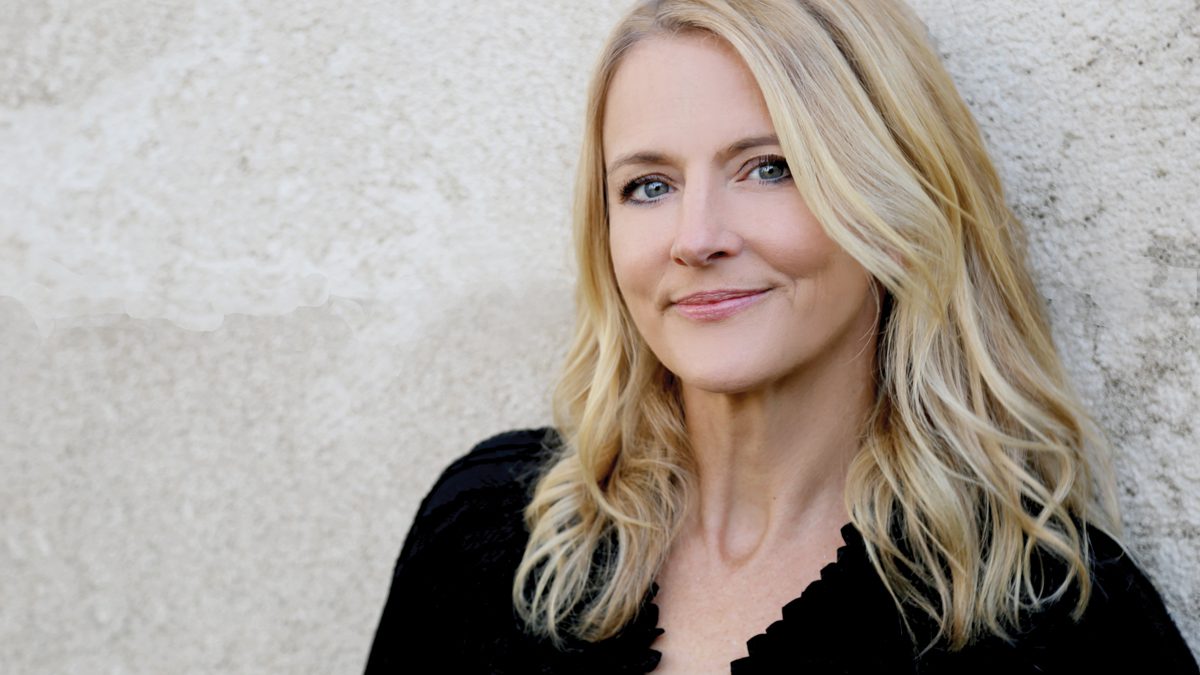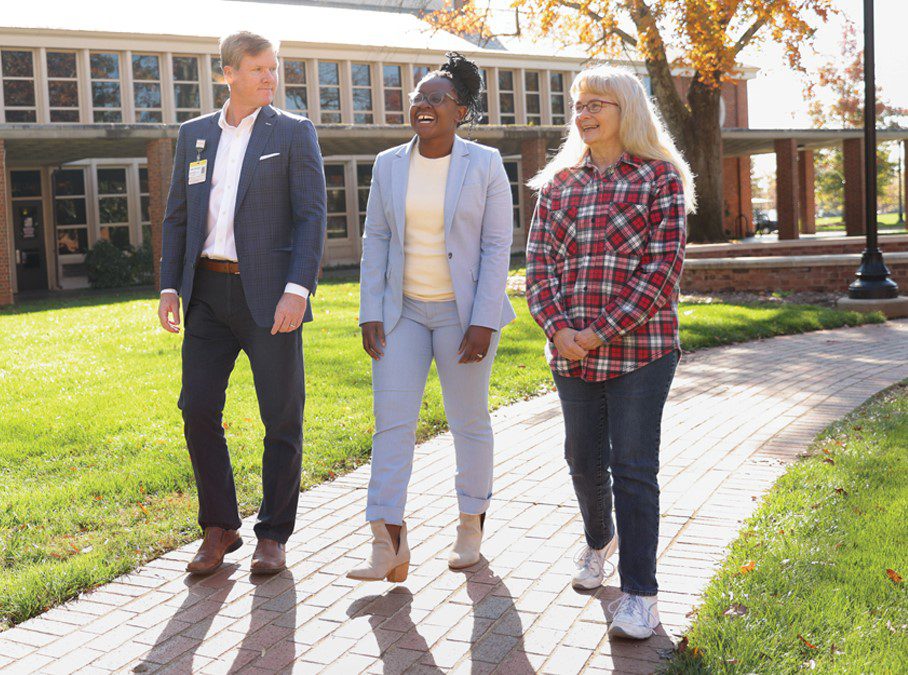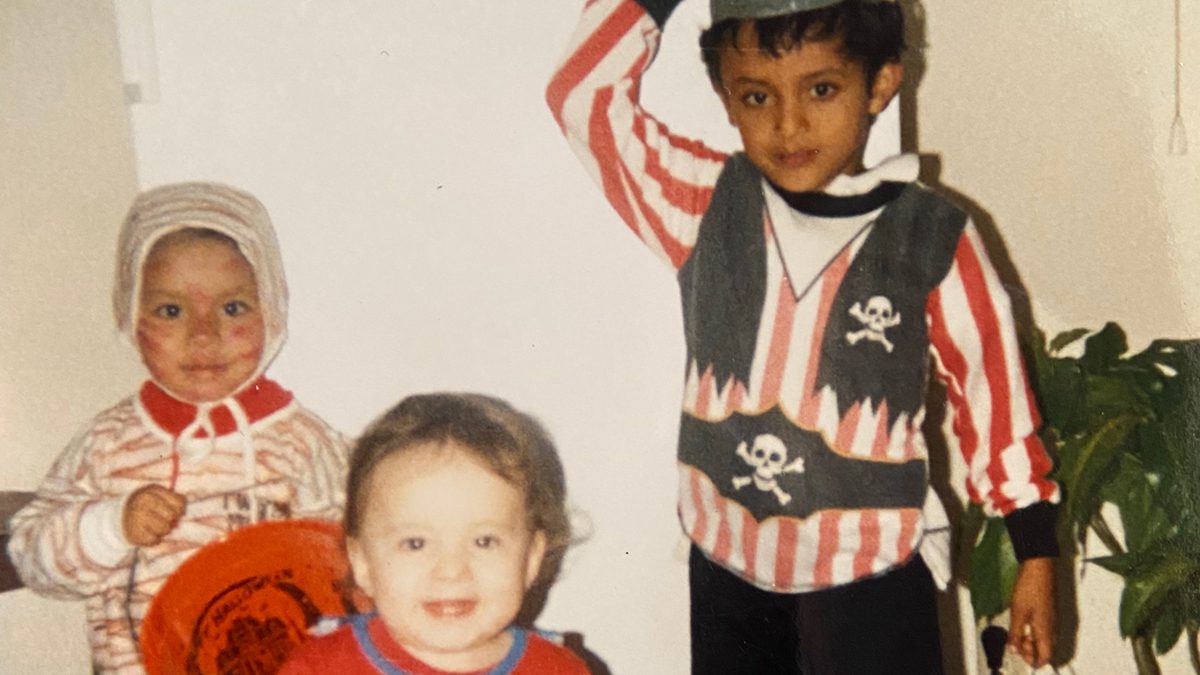
Feature
‘I Would Have Wanted Them to See’
Saul Antonio Rivera ’13 finds renewal through forgiveness.
By Kelley Bruss
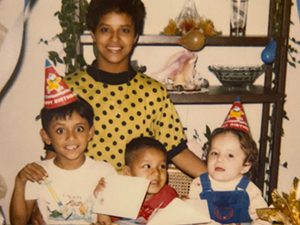
Saul Antonio Rivera ’13 (far left) on Halloween at Fort Rucker in Alabama, in 1990, with his brother Darwin and sister, Cindy / courtesy photo
Saul Antonio Rivera ’13 defines himself relationally. He is a brother, a son, a husband, a father. There was a time, however, when he was none of these – and he almost lost himself. But he is a friend, too, and he leaned hard into those relationships through years of staggering loss.
“He has a lot of best friends,” says his wife, Rebekah Rivera, then corrects herself. “Really, he only has friends that are his best friends.” Rivera’s mother, Norma, died when he was 11. He and his two younger siblings, Darwin and Cindy, were desperate for people to step into that emptiness.
“I knew what that felt like, literally, my entire life,” he says. Rivera was born in Honduras. He came to the United States as a 5-yearold, after his mother’s marriage to Mark Kissick, an American soldier. Military life took them to Ohio, Kansas and Alabama before Kissick ended his service and the family made a final move to the Upstate of South Carolina. Rivera learned English in kindergarten.
He remembers his mom urging him to use it carefully so he wouldn’t give people a reason to make fun of him. He tells his story matter-of-factly, but there are moments that catch you off guard.
He references his mother’s death, for example, but not until later does he say that she was murdered – by Kissick, his stepfather, who was found guilty after eight minutes of jury deliberations. An uncle cared for the children until his own arrest on drug charges. Then a teenaged Antonio took on much of the weight of caring for his two siblings.
On Sept. 11, 2001, Rivera was sitting in a criminal justice class at Berea High School. His teacher was turning on the television for a video, but before he could press play, news flashed on the screen.
“That was the first time I ever felt scared, legitimately, for my life,” Rivera says. His next thought: “I just can’t wait to finally get out of high school and go straight into the Marine Corps.”
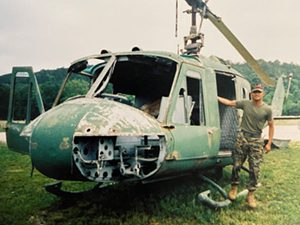
Gunner/driver E-5 Sgt. Rivera serving in the U.S. Marine Corps in 2004 at Fort Leonard Wood in Missouri / courtesy photo
Overwhelming support
Three weeks after graduating, Rivera arrived at the recruit depot at Parris Island. But it wasn’t only about his country. The pay allowed him to rent a townhome near Furman for his brother and sister. Rivera served two tours in Iraq as a gunner and driver. When he left the Marines, he was ready to get back to his education. He started at Greenville Technical College, where he met Brett Barclay, who was then director of Furman’s Undergraduate Evening Studies program. (Barclay, who is married to Furman Associate Professor of Spanish Maria Rippon, now works as an advisor in Greenville Tech’s School of Health Sciences.)
Overwhelming support Rivera moved from Greenville Tech to Furman to study business administration in the evenings while working during the day. Barclay says Rivera makes everyone around him comfortable, mostly by demonstrating genuine interest in them and their stories. He can’t count the number of times other students told him Rivera helped them through some problem. “Whenever something good happened, he was a part of making it good,” Barclay says. “As he went through his education, he balanced work and school and helping people out in his community.”
Then, when Rivera was a sophomore, his brother, Darwin, was in a fatal motorcycle accident. Mark Johnson, who worked at the time for Donate Life SC, met Rivera and his sister Cindy at the hospital, where they were making arrangements to donate Darwin’s organs to six recipients.
Johnson quickly picked up on the depth of the ties between the two siblings, the only remaining members of their childhood family. So when Cindy died in a car accident days before Rivera graduated from Furman, Johnson despaired for his friend. Barclay sent out a plea to students in the evening program, asking for help with Cindy’s funeral expenses. The response overwhelmed him.
“Some of them didn’t even have class with him, they just knew him from the program,” Barclay says. Barclay always hoped that besides mentoring and advising students, he might go so far as making a lasting impact on their lives. “You never expect that a student is going to do more of that for you than you did for him,” Barclay says.
Rivera was honored with the Frances Selby “Gig” Meredith Outstanding Student Award, which was given annually to one student who represents the perseverance, dedication and academic excellence needed to complete a bachelor’s degree at Furman as a non-traditional student. (Furman’s Undergraduate Evening Studies program was discontinued in 2020.)
Rivera says it was the academic challenges at Furman that helped him survive those years.
“By the grace of God, Furman gave me purpose and a goal to achieve during my most arduous life experiences,” he says. Reconnection through forgiveness Rivera and Rebekah moved to Florida shortly after graduation. He joined friends in their restaurant business and Rebekah worked as an accountant.
Rivera describes himself as shut down at the time, and Rebekah remembers an emotional wall – distance designed to protect him from more loss. They were planning their wedding when he learned his stepfather was coming up for parole. He wrote a letter in favor of his release. Barclay remembers conversations about Kissick during Rivera’s college days.
“You can spend your life hating or you can do it a different way,” says Barclay. “He had decided that he wasn’t going to let it eat him up inside.” Kissick and Rivera reconnected in person two days before the wedding.
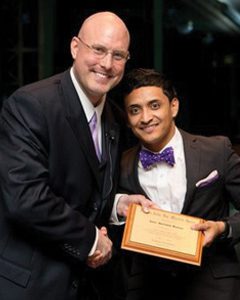
Rivera at commencement in 2013 (right) with Barclay.
“I was nervous,” Kissick says. “He wasn’t. He was so friendly. He was hugging me.” Kissick is amazed at the man his son has become. “I wish I could take credit for any of that, but I can’t,” Kissick says. “He’s a very special young man.”
Rebekah says reconnecting was about forgiveness but also about closing a gaping wound – the absence of any remnant of his childhood. Still, she couldn’t have predicted that Kissick – whom Rivera calls his dad, not his stepdad – would become one of those close friends in her husband’s world.
“He’s not only forgiven him, but he wants him in his life,” she says.
They talk or text daily. And the renewed relationship gave Rivera something back that he thought he’d lost forever: his childhood.
“He’s the only other connection I have to that,” he says. Healing and renewal Today, Rivera is a stay-at-home dad to Penelope, 3, and Roman, 1.
The pandemic forced his wife to work from home – an arrangement they all liked so much that she has stayed, even when she had the option to go back to the office. When they were expecting Penelope, Rivera wanted a special way to welcome her into his world. He wrote and illustrated a children’s book, “Are You Our PawPaw?” about two lost Christmas puppies looking for their family. His heart is on its pages.
Even with his mother and siblings gone, his identity as a son and brother underpins who he is. Rivera says when he’s doing something for someone else, it’s not just for that person – it’s for Darwin and Cindy.
“It was a huge driving factor to keep going, to keep doing things I would have wanted them to see me doing,” he says. Forgiveness made him a son again. But he wasn’t the only one healed.
“To bring my grandchildren, his children, into my life,” Kissick says, pausing. “There’s nothing more I can ask for than to have the experience of him and his children and his wife.”
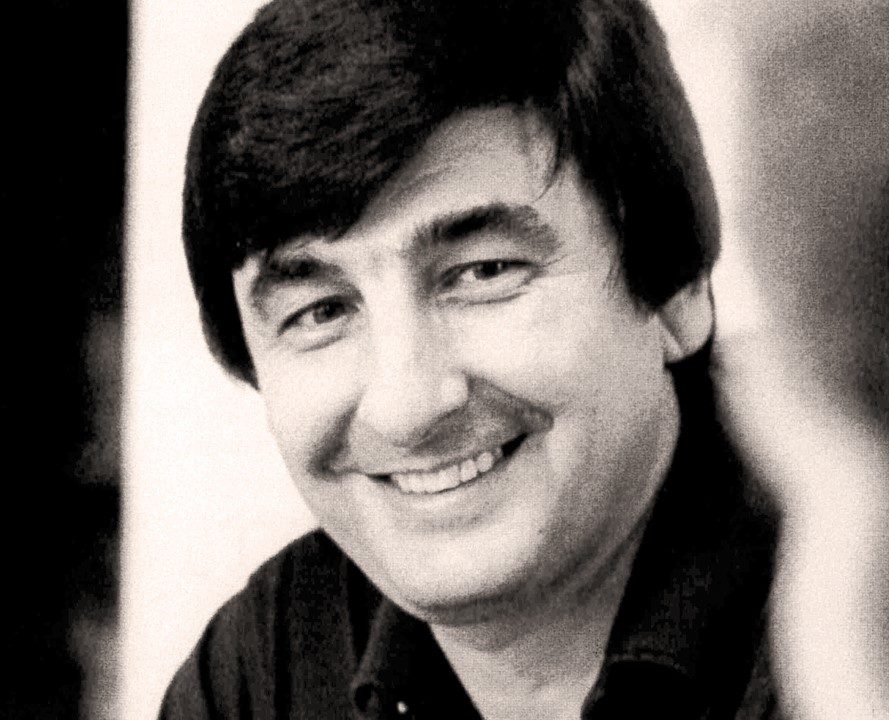
The unsparing Marshall Frady ’63 took on politicians, critics, social norms and Furman of the 1960s.
